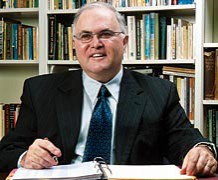Burgess Memories: Professor Ronald A. Sharp
-
Ronald A. Sharp
- 24th January 2017
-
category
- Burgess Memories
 In 1980 Anthony Burgess spent a week at Kenyon College in Gambier, Ohio, delivering the John Crowe Ransom Memorial Lectures. As Editor of The Kenyon Review at that time, I spent a good deal of time talking with Anthony, but there are two stories that should be preserved.
In 1980 Anthony Burgess spent a week at Kenyon College in Gambier, Ohio, delivering the John Crowe Ransom Memorial Lectures. As Editor of The Kenyon Review at that time, I spent a good deal of time talking with Anthony, but there are two stories that should be preserved.
One afternoon at lunch, we were discussing a book that I had recently published about the poet John Keats. Early in that conversation Anthony told me that, some years ago, he was giving a talk about Keats to a group of women at Keats House in Hampstead, where the poet, who was in his twenties at the time, had lived before traveling to Rome, where he died. During his lecture, Anthony told me, the ghost of Keats interrupted him and began chiding him for trivializing everything that Keats held precious about poetry. Keats’s point, he said, was that he was appalled that after all his immense labor and difficulty, it had all come down to, as Anthony put it, “some novelist talking about me to a group of ladies dabbling in poetry.” Although I was struck at the time by his casting of Keats as thoroughly patronizing towards women, what amazed me was how casually Anthony referred to speaking with Keats’s ghost, as though there was nothing at all unusual about such a claim. He must have read in the expression on my face how puzzled I was that he was referring to a conversation with a ghost as though it were the most ordinary thing in the world, and he was right. Anthony had referred to talking with a ghost as though he were answering some question about what the weather was yesterday and had indicated that it was humid but with just a touch of rain. ‘Oh!’ he exclaimed. ‘Sorry. You probably think it’s odd that I believe in ghosts. But the fact is, I’ve had so many conversations with ghosts during my life that I can’t any longer have a serious discussion about whether ghosts exist. So in any case, Keats was really pissed off at me,’ and he continued with the story as though of course one regularly had conversations with ghosts.
On another occasion we were having coffee and talking about a wide range of topics when, after about twenty minutes, he took out some blank sheets of paper and started drawing the lines for a musical staff. Without missing a beat in our conversation, he converted numerous empty pages into staffs for musical notation, which struck me as an unusual kind of doodling. Ten minutes later, one of these pages was completely filled in with a musical score and Anthony – again, without the slightest hitch in our conversation, which at that point had turned to our mutual admiration for the work of George Steiner – simply continued onto the second page. When he got half way down that page, he interrupted whatever he was saying about Steiner and, just as he had when telling me about talking with Keats’s ghost, apologized to me and explained himself. ‘Please,’ he said, moving his eyes from the musical score in front of him to look directly at me. ‘Please don’t be offended. I can write music and talk at the same time. I do it a lot. It’s just that an idea just now came to me for a piece for the bassoon that I recently promised someone I’d write.’ As it turned out, he had met one of my colleagues a few days before, and since the topic of his John Crowe Ransom Lectures was the relationship between music and literature, it had come out that my colleague played the bassoon. After a brief chat, Anthony promised to write her a new composition for the bassoon, and since the idea had just come to him while we were having coffee and talking, he simply grabbed some paper, put some staffs on it, and jumped right in.
Ronald A. Sharp is Professor of English at Vasser College in Poughkeepsie, New York. He was Dean of the Faculty between 2003 and 2008. He was the founding editor of revived The Kenyon Review from 1978 to 1982.


